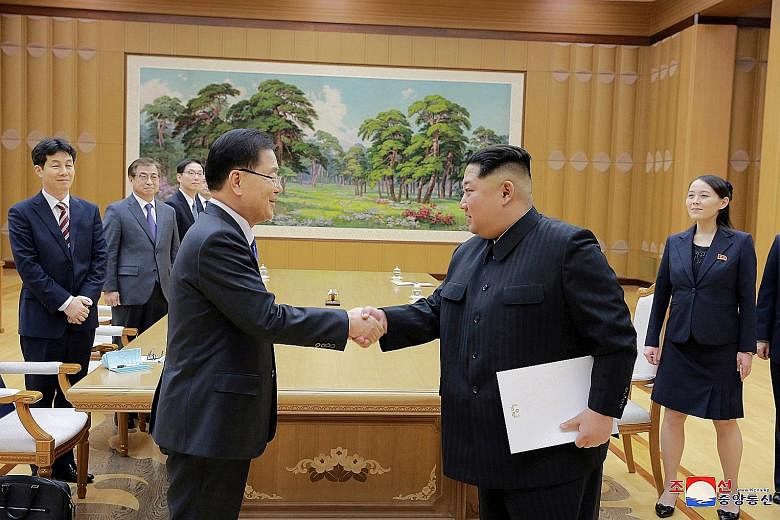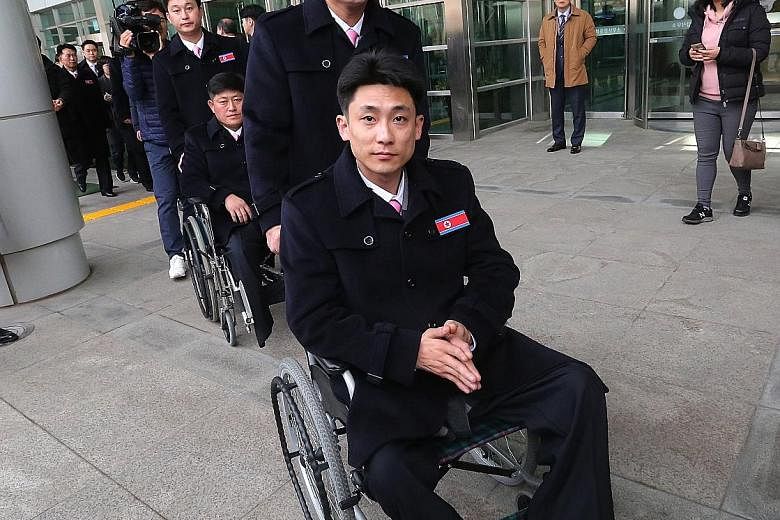South Korean President Moon Jae In has said that efforts to establish peace in the region had reached a "very critical juncture", but his country would not settle for anything less than the denuclearisation of the North.
In a bid to assuage growing concern about his administration's eagerness to engage Pyongyang, he also told a group of political leaders yesterday that there were no plans to ease sanctions against North Korea ahead of his planned summit with its leader, Mr Kim Jong Un, late next month.
Inter-Korean talks alone would not be enough to achieve peace, said Mr Moon.
"It is too early to be optimistic because we are only at the starting point," he said while stressing the importance of close cooperation with South Korea's main ally, the United States.
His comments came amid a mixed bag of reactions to Seoul's announcement on Tuesday that the North was willing to hold denuclearisation talks with the US and would freeze all provocative acts while talks were in progress.
US President Donald Trump described Pyongyang's offer as sincere, but said it came after much pressure. "I think they are sincere because of the sanctions with respect to North Korea, including the great help we have been given by China," he said during a White House press conference, adding that the sanctions imposed on the North had been "very strong and very biting".
China and the United Nations also welcomed the agreement by the two Koreas to hold a summit.
China's Foreign Ministry spokes-man Geng Shuang said yesterday that Beijing was "very pleased to see positive results" from interactions between the two Koreas, and China was willing work with other nations to promote denuclearisation.
United Nations Secretary-General Antonio Guterres said he was "encouraged" by advances made towards inter-Korean dialogue and future denuclearisation talks, stressing the need to "protect the momentum and seize the opportunities available to find a peaceful path forward".
Japan, however, remained concerned that Pyongyang was merely trying to buy time to continue its nuclear programme. Defence Minister Itsunori Onodera said Tokyo must assess the situation carefully.
"There is no need to ease pressure until it is confirmed that North Korea is going to change its policies," he said.
North Korea has long stuck to its central "Byungjin Line" policy of simultaneously pursuing nuclear and economic development. It conducted over 30 missile launches and three nuclear tests in the past two years, sending tensions soaring.
Inter-Korean ties thawed only after Pyongyang launched a charm offensive to woo Seoul in January - a move many feared was a ruse to drive a wedge between South Korea and the US, and to break free from US-led sanctions and pressure.
North Korea has in the past repeatedly made promises to abandon nuclear weapons, only to eventually walk out of talks and return to provocations.
South Korea's opposition parties were sceptical of Tuesday's announcement. The main opposition Liberty Korea Party denounced it as part of the Pyongyang regime's "deceptive peace offering", while the minor Bareunmirae Party warned against unrealistic expectations.
News outlets were also divided about the North's intentions.
The conservative Chosun Ilbo said in an editorial that there were positive points, but "a question mark" remained over whether the North was genuinely willing to give up its nuclear arsenal. The progressive Hankyoreh hailed Tuesday's announcement as "an achievement with great significance", while the Korean language Dong-A Ilbo daily warned advancing inter-Korean ties without US involvement could "easily cause misunderstanding and conflict" between Seoul and Washington.
SEE OPINION


